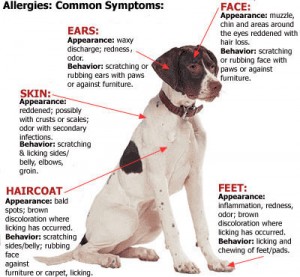Articles tagged with: dog allergies
Dog Health »

Dog allergy treatments. Human beings are not the only species that can suffer from allergies. Dogs can also have allergic reactions to objects in the home, chemicals and pollutants in the air, dog food, and their own hair and dander. Finding the source of these allergies can be difficult especially if the dog is allergic to a few things. If you have a dog that suffers from allergies, you may notice that they sneeze when around harmful chemicals, vomit after eating, have skin rashes, patches of fur missing, runny nose and eyes, or they may show signs of fatigue or restlessness.
Dog Health »

Dog allergies signs. Dogs that have allergies show many signs including watery eyes, coughing and sneezing, excessive scratching and biting, vomiting, diarrhea, fatigue, and moodiness. When your dog is suffering from allergies, you may notice one or more of these symptoms. Learning what causes these allergies is the first step toward treating your dog and preventing further attacks.
Dog Health »
Tips on how to help your dog cope with allergens
Are you sensitive? Do you easily get allergic to things around you like dirt, dust and some types of food? Did you know that your dog is likewise prone to allergies? Dog allergies, just like in humans come from many sources. If you can then make your home allergy free, your dog will benefit on this as well.
Please note that allergies in dogs may cause infections that will definitely hurt your dog. This is the reason why you need to know what is causing allergic reactions.
[caption id="attachment_1224" align="aligncenter" width="300" caption="Symptoms of Dog Allergies"] [/caption]
[/caption]
Below are some useful tips on how to help your dog cope with allergens.
Symptoms of dog allergies
- Sneezing
- Coughing
- Watery eyes
- Itching
- Chewing
- Biting
- Vomiting
- Diarrhea
This is only a short list of possible symptoms. They are however the most common manifestation of a dog allergy. It is always best to consult your veterinarian if you notice your dog having some sort of difficulty due to allergies.
Causes of dog allergies
- Inhalation of household chemicals, i.e., carpet cleaner, detergent, air freshener
- Inhalation of dust from the air or his own beddings
- Pollen, during the spring and fall season your dog may catch many types of allergens
- Fleas, they cause extreme discomfort
- Dog Food i.e., beef, dairy products, wheat, corn and soy beans
You may not easily detect what may be causing your dog to become allergic. Thus, if you suspect that your dog is having discomforts because of allergy, immediately bring him to the veterinarian. Tests will determine what is causing your dog’s allergy.
If you have recently offered a new dog food, or a new dog bed or even a new dog shampoo and notice allergy symptoms, they may be the cause. In that case, stop the use of anything new and see how the allergy reacts. If the itching or red skin disappears, it is more than likely an allergic reaction.
Tips to help avoid dog allergies in your home
- Bathe your dog at least once a week. Cool bath with oatmeal may help soothe itching if fleas and mites are the problem.
- Vacuum and dust your home as frequently as possible. Please note that summer season is flea season. Spring and fall on the other hand may cause inhalation allergies.
- Plastic eating bowl may likewise cause allergies, if you can convert your dog to steel, glass, or ceramic bowl. This could be helpful.
- Wash dog beddings frequently. If he is sensitive, avoid bring him out until you know what is causing his allergies.
Treatment for dog allergies
- For an all natural dog allergy treatment, you may introduce a dog vitamin supplement.
- Veterinarians may advice antihistamines or other drugs such as benadryl.
- Medicated shampoos and sprays may also help lessen the itching. Oatmeal works well.
- Flea products may also be helpful. You may however need to avoid putting topical flea product on broken skin.
After series of tests, your veterinarian may advice avoidance of particular food or giving your dog nutritional supplement that will help increase his resistance to allergens.
Photo source:healthcasual.com
















 The
The